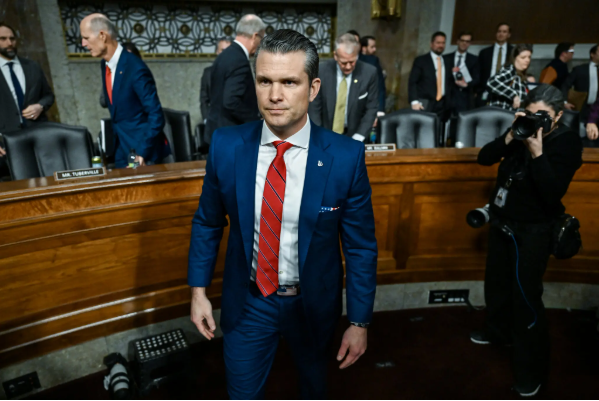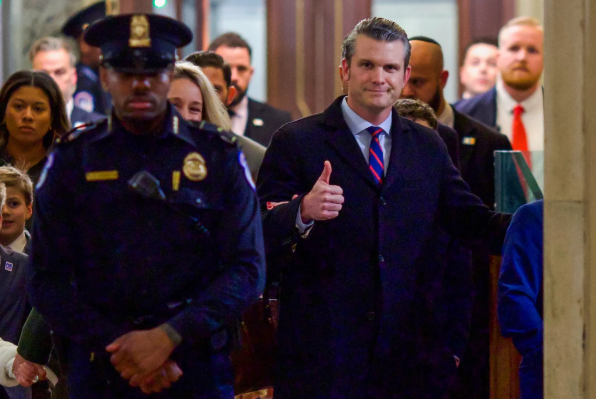Pete Hegseth has vowed to bring his “warrior” ethos to the Pentagon. Democrats had assailed him as unfit for the job, and his confirmation came down to Vice President JD Vance serving as tiebreaker.
The Senate narrowly confirmed Pete Hegseth as defense secretary on Friday after a contentious battle with Democrats, who argued that the Trump nominee was unqualified and unsuitable to lead the Pentagon’s nearly $850 billion budget and 1.3 million active-duty troops.
Vice President JD Vance cast the tiebreaking vote, securing Mr. Hegseth’s confirmation with a 51-50 margin. Three Republicans—Senators Susan Collins of Maine, Lisa Murkowski of Alaska, and Mitch McConnell of Kentucky—joined all Democrats in opposing the nomination, marking the slimmest margin for a defense secretary’s confirmation since the role was established in 1947.
Mr. Hegseth, a military veteran and former Fox News host, pledged to bring a “warrior” ethos to the Defense Department, criticizing what he described as its weakening under “woke” policies. Republican leaders supported his vision. “Peace through strength is back under President Trump and Pete Hegseth,” said Senator Roger Wicker of Mississippi, chair of the Armed Services Committee. “We cannot wait another minute to rebuild our military might and put the war-fighter first.”
Democrats, who unanimously opposed Mr. Hegseth, vowed to maintain rigorous oversight. “I am going to watch him like a hawk,” said Senator Jack Reed of Rhode Island, the committee’s ranking Democrat. “I will demand accountability.”

Mr. Hegseth’s confirmation process faced significant controversy, including allegations of personal misconduct. A sworn affidavit from Danielle Diettrich Hegseth, the former wife of his brother, accused him of abusive behavior and heavy drinking. In addition, Mr. Hegseth disclosed paying $50,000 in 2017 to settle a sexual assault claim, which he described as consensual. He denied all allegations, calling them “anonymous smears” during his hearing.
Despite the controversy, most Republican senators stood by Mr. Hegseth. Senator Thom Tillis of North Carolina, initially hesitant, ultimately voted to confirm him, citing Mr. Hegseth’s military experience and commitment to modernizing the armed forces. “Pete has a unique perspective as a veteran of Iraq and Afghanistan and is unquestionably passionate about supporting those who serve our nation,” Tillis said.
The three Republican senators who opposed Mr. Hegseth did not directly cite the allegations against him. Senator McConnell explained his vote, stating that Mr. Hegseth lacked the necessary grasp of national security challenges. “This is the most consequential cabinet role in any administration,” McConnell said. “Mr. Hegseth has failed to demonstrate that he can meet this test.”
The confirmation marks a rare instance of controversy for a defense secretary appointment. By contrast, recent nominees such as Lloyd J. Austin III and Jim Mattis received overwhelming bipartisan support. Still, contentious confirmations are not unprecedented; in 1989, John G. Tower was rejected amid allegations of alcohol abuse and misconduct.
Mr. Hegseth now faces the challenge of overcoming the divisiveness surrounding his confirmation. Democrats have pledged continued scrutiny, and the allegations against him remain a point of contention. Whether he can unite the Pentagon and fulfill his pledge to prioritize the military remains to be seen.
Danielle Diettrich Hegseth, the ex-wife of Pete Hegseth’s brother, who submitted an affidavit this week accusing him of abusive behavior toward his second wife, released a statement following the confirmation vote. “Today’s outcome will further silence women who have experienced abuse and mistreatment, as it reinforces the mechanisms—such as gag orders and fear of retaliation—that keep them from speaking out,” she said.



